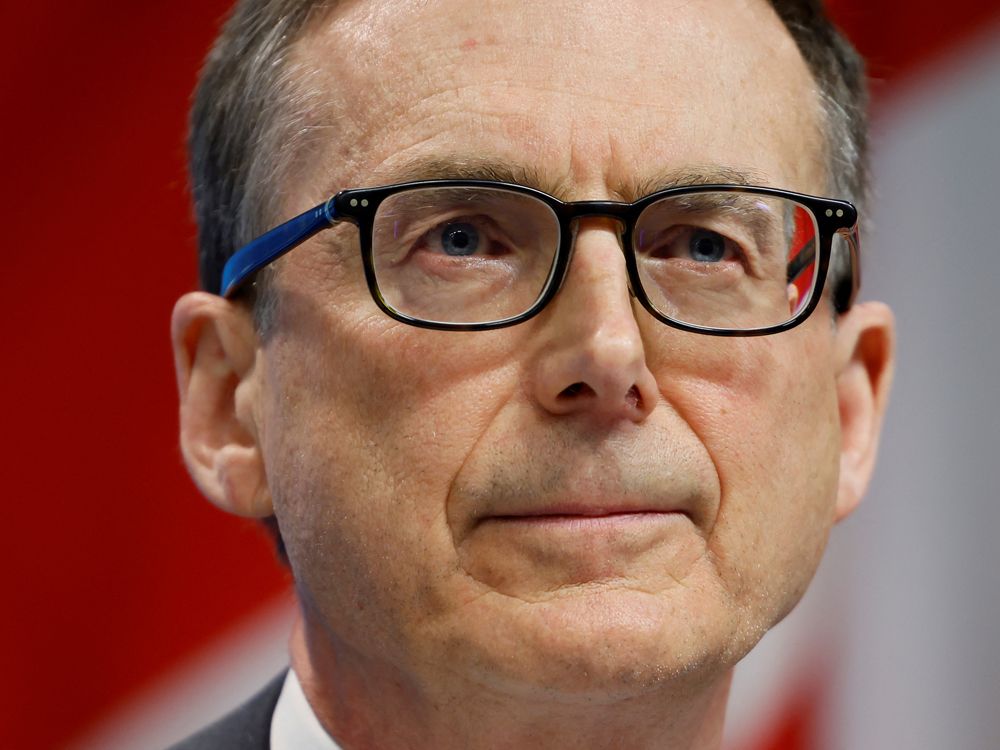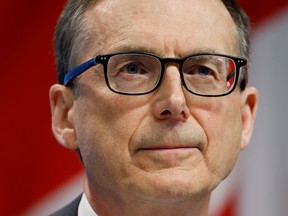Tiff Macklem acknowledges inflation is running hotter than expected

Kevin Carmichael: Concession will fuel speculation of steeper hikes, but half a point still best bet

Article content
Bank of Canada governor Tiff Macklem acknowledged inflation ended the first quarter hotter than he expected, a concession that will feed speculation the central bank could accelerate its march to a more normal interest rate setting.
Advertisement 2
Story continues below
Article content
“These supply disruptions, there’s really no sign that they are easing,” he said when asked about Statistics Canada’s March inflation reading, which showed the consumer price index surged 6.7 per cent from a year earlier, the biggest increase since 1991.
The central bank’s comfort zone for inflation is one per cent to three per cent.
“We’ll have another month’s data before we get to our next (interest-rate) decision (on June 1),” Macklem said. “But, yes, it did come in a bit higher than we were expecting.”
Forecasts ahead of the latest inflation numbers suggested the central bank and Bay Street were expecting something closer to six per cent. The miss emboldened critics who think the Bank of Canada is behind the curve, despite executing an unusually large half-point increase of the benchmark interest rate last week. Chatter that Macklem could be forced to get even more aggressive in the months ahead grew louder.
Advertisement 3
Story continues below
Article content
A three-quarter-point increase is unlikely. The argument that inflation peaked in March is at least as strong as the one that insists the central bank has lost its grip on prices. That means a second half-point adjustment remains the best bet for the Bank of Canada’s next policy update. Still, reporters couldn’t resist asking if the central bank was prepared to go bigger.
“I’m not going to rule anything out,” said Macklem, which is typically what central bankers say when they are asked about future policy decisions. “We raised 50 basis points last week. That in itself is an unusual step.”
The Bank of Canada prefers quarter-point adjustments to reduce the risk of unintended consequences that would force it to backtrack. Macklem and his deputies are especially wary of shocking debt-burdened households that have grown used to low borrowing costs. The dampening effects of interest-rate increases will quite likely be magnified under such conditions.
Advertisement 4
Story continues below
Article content
“We signalled that Canadians should expect further increases in interest rates,” Macklem said. “I’ve used the wording that we need to normalize monetary policy reasonably quickly and we’re prepared to be as forceful as needed,” he added. “I’m really going to let those words speak for themselves.”
-

Kevin Carmichael: Roaring inflation leaves Bank of Canada little choice but to come on strong
-

Canada’s inflation rate comes in much hotter than expected
-

Get ready for interest rates to rise ‘very, very quickly:’ CIBC’s Benjamin Tal
A year ago, Macklem and other central bankers thought inflationary pressures were primarily the result of supply shortages. He reiterated that things have changed, and that strong demand has become an important factor.
Advertisement 5
Story continues below
Article content
However, he stressed that the surprises in the March numbers were primarily the result of ongoing supply constraints. He flagged increases in the prices of durable goods such as appliances, furniture and automobiles. Food prices probably are being affected by the war in Ukraine, a big exporter of wheat, and COVID-19 lockdowns in China are “creating a new level of uncertainty,” he said.
“Inflation is going to be higher for longer, or, to put it a little more positively, it is going to take longer to come down,” Macklem said. “That reflects the fact that the war has pushed up commodity prices. It also is further disrupting already disrupted supply chains. It’s disrupting trade. Disrupting shipping.”
He added: “Against that background, there is a need to be more forceful, and we took an important step last week.”
• Email: [email protected] | Twitter: carmichaelkevin
Advertisement
Story continues below








